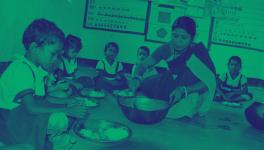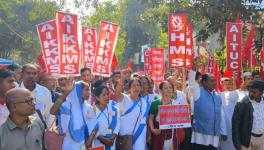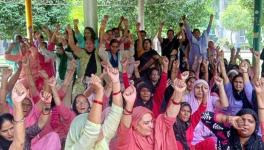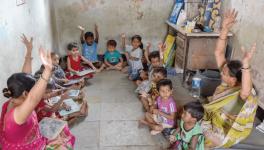How the Lockdown Destroyed Children’s Nutrition Programmes
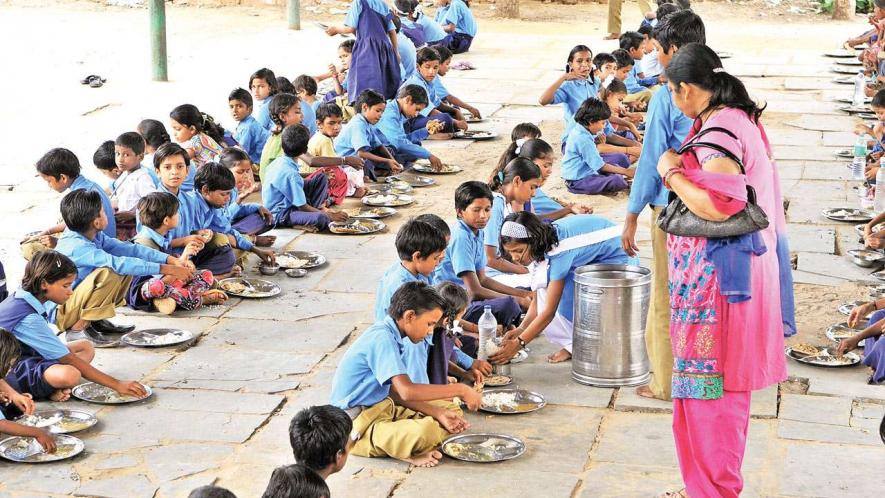
The world’s two biggest child nutrition programmes – the ICDS or Integrated Child Development Scheme and the Mid-Day Meal (MDM) programme – run by the Indian government suffered a severe jolt in March and April this year as foodgrain allocated for them was not made available during the sudden, ill-conceived lockdown that began on March 24 midnight.
The offtake of foodgrain (rice, wheat and coarse grains) plummeted from 335,000 tonnes to just 109,000 tonnes for the Mid-Day Meal programme, which currently feeds an estimated 12 crore children studying in classes 1-8. As can be seen in the chart below, the mid-day meal offtake reduced to nearly a third of what it was in the same period last year.
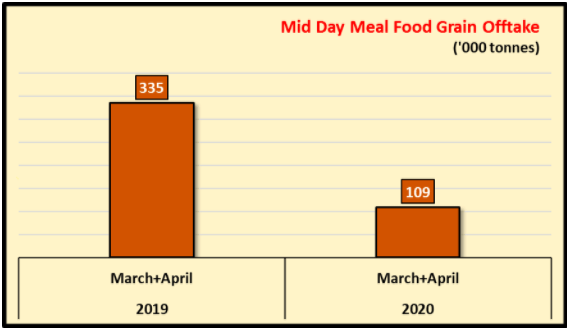
For the nutrition programme run by anganwadi centres under the ICDS, foodgrain offtake dipped from 238,000 tonnes last year (March and April) to a mere 97,000 tonnes this year in the same two months. These anganwadi centres are estimated to feed about 14 crore children in the age group 0-6 years. The ICDS also provides supplementary nutrition to pregnant and lactating mothers and adolescent girls, both being chronic sufferers of malnutrition and anaemia.
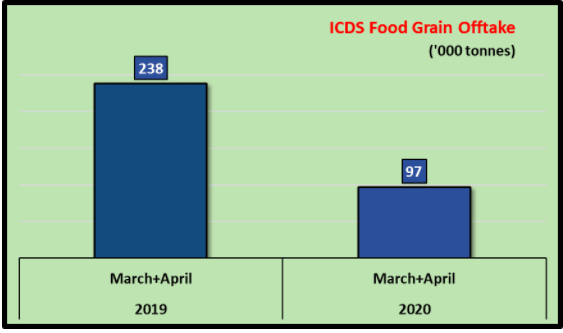
Data for offtake is available in the monthly Food Grain Bulletin issued by the department of food and public distribution.
Both programmes form a vital link in providing nutrition to children in India, where over a third of those under five years are underweight and over half of them suffer from anaemia, as reported in the last National Family & Health Survey (NFHS).
The break in nutrition provision for these children would have very serious consequences for their future mental and physical growth, especially at a time when their parents, too, would have lost their earnings in the lockdown.
What Went Wrong
Foodgrain is allocated from the central pool, which is established by procurement of foodgrains over the year by government agencies. In April this year, 570 lakh tonnes of foodgrains were held in stock by the government. This increased to 644 lakh tonnes in May and then to 834 lakh tonnes in June (as of date), according to the department of food and public distribution. These are record levels of foodgrain stocks.
These foodgrain stocks are utilised to fulfil the country’s food requirement through the Public Distribution System or PDS as well as certain key welfare schemes like ICDS and MDM.
Once the foodgrain is allocated by the Central government, it is transported to various states that do not have the requisite grain in their own stock. Then it is distributed through various channels to thousands of fair price shops, as also to the anganwadis and schools.
It was this complex logistical exercise of making available the foodgrain to consumers that the Central government failed to plan out before suddenly declaring the lockdown in March. Since the railways were also shut down and road transport prohibited, grain could not be transported to the designated places. No clear directions were issued by the Central government on how these programmes are to be implemented, leaving the employees as well as millions of children in the lurch.
Scheme Workers Too Suffered
A tragic spin-off in this tale of neglect is the distress faced by over 25 lakh anganwadi workers and helpers and over 29 lakh cooks/helpers who were doing the actual ground work in these two massive programmes. Many of them were diverted to other work – like surveys, looking after quarantine centres, help implement the lockdown measures and such like.
Their earnings also took a major blow, besides being exposed to the dreaded virus. Most of them worked in the pandemic-related functions without adequate protective gear. Many have not received their meagre wages and are struggling to survive in these harsh conditions.
Long List of Follies
This obvious error or act of omission joins the long list of such follies and neglect of ground realities that the Narendra Modi government has done while going in for the dramatic “shock and awe” lockdown.
Other follies in this list include gross neglect of the fact that the rabi harvest was standing in the fields (harvesting was allowed after three days of lockdown), neglect of the plight of migrant workers who were stranded without earnings in distant cities and many were forced to walk back hundreds of kilometres, neglect of workers, both industrial and agricultural, who were suddenly deprived of earnings and faced starvation, neglect of the vast army of service sector employees, mainly in the urban areas who also lost their jobs and earnings, stopping of routine healthcare services including immunisation programmes, stopping of the rural job guarantee scheme (MGNREGS) and so on.
But the cut-back in such essential services, such as infant nutrition programme and the MDM programme is an irreversible damage to a whole generation of children. Although on paper the government declared that meals or dry rations would be provided at homes of the children, most state governments were unable to do so, barring a few exceptions like Kerala and some others.
Get the latest reports & analysis with people's perspective on Protests, movements & deep analytical videos, discussions of the current affairs in your Telegram app. Subscribe to NewsClick's Telegram channel & get Real-Time updates on stories, as they get published on our website.










